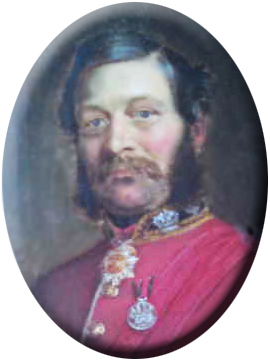
J.J. Graham
A Biographical Sketch
by Christopher Mewett
James John Graham, who in 1873 produced the first English translation of Carl von Clausewitz's famous book On War, was born at Morrison's Island, Cork, in 1808 to General Samuel Stevenson Graham. General Graham, who was Deputy Governor of Stirling Castle for thirty years, was posted to Ireland from 1808–1813. (S.S. Graham was quite the impressive character in his own right, and Jane Graham, née Ferrier, was from a very prominent family.)
 J.J. Graham was at Sandhurst from 1822 to 1824, when he purchased a commission as an ensign in the 75th Foot. Two years later, he was promoted to lieutenant in the same regiment, and he became a captain in 1830. He got married for the first time, to Anna Marie Mason, in 1831, the same year his father died. In 1833 he was placed on half-pay, and Chris Bassford has written that he worked for the South-Eastern Railway Company for a couple of years.
J.J. Graham was at Sandhurst from 1822 to 1824, when he purchased a commission as an ensign in the 75th Foot. Two years later, he was promoted to lieutenant in the same regiment, and he became a captain in 1830. He got married for the first time, to Anna Marie Mason, in 1831, the same year his father died. In 1833 he was placed on half-pay, and Chris Bassford has written that he worked for the South-Eastern Railway Company for a couple of years.
Graham was reactivated as a captain in the 70th Foot, the regiment he considered his own (as evidenced by an inscription on his tomb) in 1835. The regiment left for Malta in July 1836 and stayed there for about 18 months. That's where Graham's son Samuel – who would become Sir Samuel James Graham KCB CB, general of Royal Marines – was born in January 1837. (Anna had given birth to a daughter Caroline in 1833, and a second daughter Euphemia would be born in 1840.)
Almost exactly a year later, in January 1838, then-Capt. Graham left for the West Indies (Barbados) with the 70th Foot. He spent about three years there, unaccompanied by family—though there was apparently some home leave in England during this time, as Euphemia was born in Kent in 1840. In May 1841 the 70th Foot left Barbados for Canada aboard the troop ship Sapphire, landing at Montreal in June.
After about 15 months in Canada, Graham decided to leave the regiment and return to half-pay in September 1842. He seems to have returned to England at this point, and his son Frederick was born in Halifax, Yorkshire that year. This was around the time that the role of Staff Officer of Pensioners was established: generally these staff officers were men on half-pay who were responsible for delivering pension payments to the wounded veterans who lived in a particular district. (It seems as though a significant part of the job was ensuring that the Crown wasn't still issuing payment to men who had died and whose families were trying to collect their pensions anyway.) The Staff Officers of Pensioners were also expected to stand at the head of their old soldiers and command them as a military formation when the government required their services for policing duties or to disperse a mob, for instance. Graham was serving as Staff Officer of Pensioners at Halifax when the army lists started documenting this role in 1844; we can presume he had taken it up immediately upon his return from Canada in late 1842, as his child was born in Halifax that year.
In October of 1844, Graham assumed the position of Staff Officer of Pensioners in the Western Division of London, but by the very next month he had disappeared from the rolls. It's not clear what he was doing for the next several years, though he was brevetted to major in 1846 (for reasons unknown), and his wife gave birth to more children: his daughter Alice was born in 1849 and his son Walter in 1850, both in Lewisham (southeast London, then in the county of Kent).
In 1851 Graham moved back to Canada to take up the Staff Officer of Pensioners role again; this time his family seems to have come with him, and one of his sons was enrolled at Upper Canada College in Toronto. Graham lived at London, Canada West (which is now London, Ontario), where he helped to oversee the settlement of pensioners from both Britain and Canada on Crown lands throughout Ontario. (This allowed the Imperial government to withdraw line regiments from the province and save money under the rationale that the pensioners were available to defend them if required.) We know that for a time in the summer of 1854, Graham was responsible for the pensioners not only in his London (Ontario) district, but also for those in Amherstburg, a settlement nearly 200 miles to the west at the mouth of the Detroit River. The Staff Officer of Pensioners there, a Captain Rogers, had drowned when his boat overturned while he was fishing in the river; Graham took over his responsibility for paying the pensioners in Amherstburg until a replacement was sent out. (I've discovered a couple of letters in Graham's hand concerning this episode in Canadian government archives.)
Graham's son Malcolm – later a colonel and a decorated veteran of the Egyptian War – had been born in 1853. In 1854 then-Major Graham was brevetted to Lieutenant Colonel; this was about six weeks after Captain Rogers drowned and before a major was sent out to replace him, so it's possible Graham's promotion was in recognition of his increased responsibilities. Less than a year later he was brevetted to Colonel (more aptly granted the local rank of colonel) to serve as the Military Secretary to Lieutenant General Sir Robert John Hussey Vivian, who was a British East India Company officer who took charge of the Turkish Contingent (aka the British Ottoman Contingent or the Anglo-Turkish Contingent: indigenous troops under British officers) in the Crimean War. It seems Col. Graham's role kept him in London, where he was officed alongside another officer (a Captain Morgan) who was responsible for recruiting half-pay officers and soldiers of fortune from Britain to staff the Contingent. Apparently 13 of these men applied after the war (which ended in winter 1855–6) to the Colonial Office to serve as prison warders in the Convict Establishment in Australia; Graham was required to endorse their applications after personal interviews with each of them. While Graham was serving in this capacity, in September 1855, his wife Anna died in London.
It's not clear what Graham did between the end of the Crimean War (when presumably he was released from his duties with the contingent) until 1858, but in that year he got remarried (to Isabella Walker, the daughter of General Frederick Nathaniel Walker, who had died the previous year), was brevetted to colonel and then sold his commission. He continued to serve as a Staff Officer of Pensioners in London, though, based at Regent's Park Barracks, and he published his first book: The Elementary History of the Art of War. He presented a copy of the book as a gift to the Royal United Services Institution in March of 1859, and he became an annual subscriber/member at RUSI around the same time. He also seems to have been a Director of the Great Britain Mutual Life Assurance Society for at least a time in 1859.
In 1862 Graham published an edited volume of his father's memoirs, and he published his second original book – Military Ends and Moral Means – in 1864. During this period he remained a Staff Officer of Pensioners at Regent's Park Barracks and resided at 3 Devonshire Terrace in Paddington. In 1868 he proposed to write another book called The Soldier's Compendium, but it appears never to have been published. Some time around then, he must have begun work on his translation of On War, the edition of which he worked from (the German 3rd edition) had been published in two parts in 1867 and 1869. The translation appeared in 1873. As Christopher Bassford has noted, the translation was a commercial failure and sold almost not at all.
In 1876, Graham was appointed to the Lower Foundation of the Military Knights of Windsor, and he resided in apartments at Windsor Castle with his wife and spinster daughter until he died in July 1883; his estate was worth about £1200. He was buried at St. Andrew the Apostle Churchyard in Windsor.
